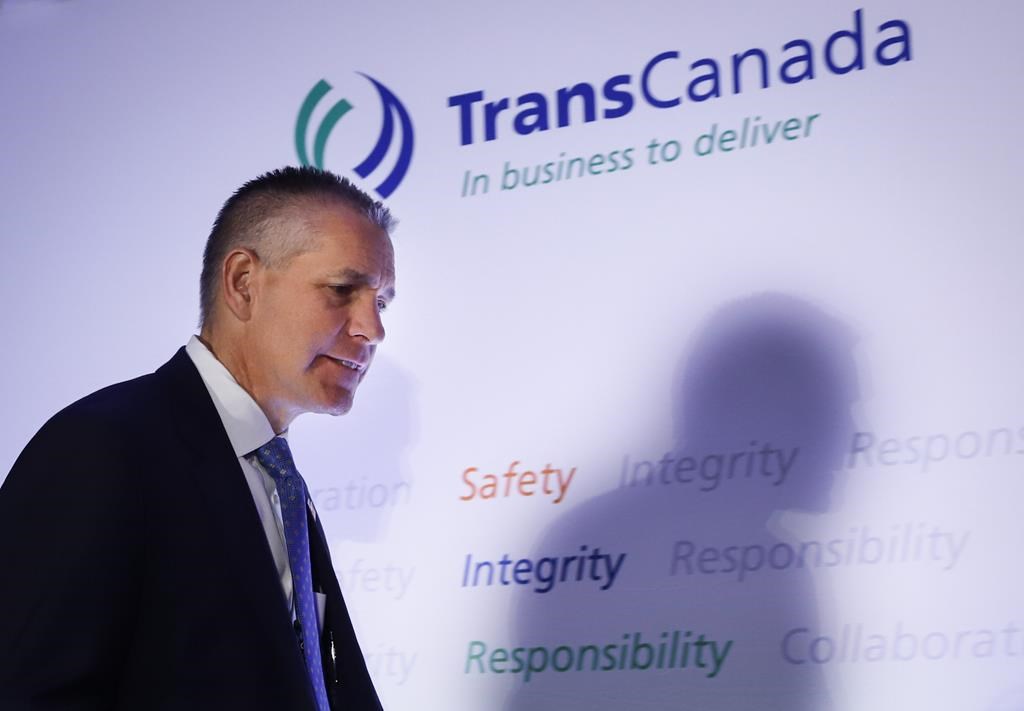TransCanada Corp. is officially dropping the “Canada” from its name, but CEO Russ Girling isn’t saying he expects it will make it any easier to get pipelines approved in Canada or the United States.

The Calgary-based company is now to be called TC Energy Corp., after shareholders approved the change at its annual meeting Friday.
“The name TC Energy acknowledges our origin as TransCanada PipeLines, while adding the word ‘energy’ speaks to the breadth of our business, which includes pipelines, power generation and energy storage,” Girling told the meeting.
“But to be clear, this is a name change, not a brand name. We are very proud of who we are and what we do.”
He declined to talk to reporters after the event.
The company said the change recognizes its growth into the United States and Mexico, including through its recent US$13-billion purchase of U.S. natural gas transporter Columbia Pipeline Group.
It has about 7,000 employees in North America, with 3,500 in Canada, 3,200 in the U.S. and 300 in Mexico.
But some analysts suggest it’s also a chance to distance itself from Canada, where difficulty in getting pipeline projects approved has been blamed for a glut of oil that caused steep discount pricing last fall and prompted the Alberta government to curtail production starting in January.
“I think the name change is semantics,” U.S.-based analyst Jennifer Rowland of Edward Jones wrote in an email.

Get breaking National news
“I don’t think it attracts new investors, but I do think it’s a subtle, or not so subtle depending on how you view it, way to de-emphasize Canada as some investors are leery of investing in Canada given the government intervention in free markets in Alberta and the difficult regulatory environment for energy.”
TransCanada’s Keystone XL pipeline from Alberta into the U.S. was first proposed in 2008, rejected by then-president Barack Obama in 2015, approved by President Donald Trump in 2016 and again in March, but remains on hold awaiting court rulings in Montana and Nebraska.
The court delays mean the project will not be able to start construction in the U.S. this year, Paul Miller, president of liquids pipelines, confirmed during an afternoon conference call with financial analysts.
The project could still be unfinished if a new federal government is elected in the U.S. in 2020, he added, but it’s hoped all permits and approvals will be in hand by then and a new administration won’t affect bringing the project on stream.
Shareholders at the meeting voted almost 90 per cent against a motion sponsored by the Pension Plan of the United Church of Canada that would have required the company to report on how it is meeting international standards for Indigenous people’s rights.
They went along with the company’s recommendation to reject the motion as unnecessary given its existing policies.
The official approval of the name change came as the company reported a first-quarter profit of $1 billion of $1.09 per share, up from $734 million or 83 cents per share a year ago.
Revenue for the first quarter totalled $3.49 billion, compared with $3.42 billion in the first quarter of 2018.
On a comparable basis, TransCanada says it earned $987 million or $1.07 per share for the quarter, up from $864 million or 98 cents per share a year ago.
Analysts on average had expected a profit of 99 cents per share, according to Thomson Reuters Eikon.










Comments
Want to discuss? Please read our Commenting Policy first.